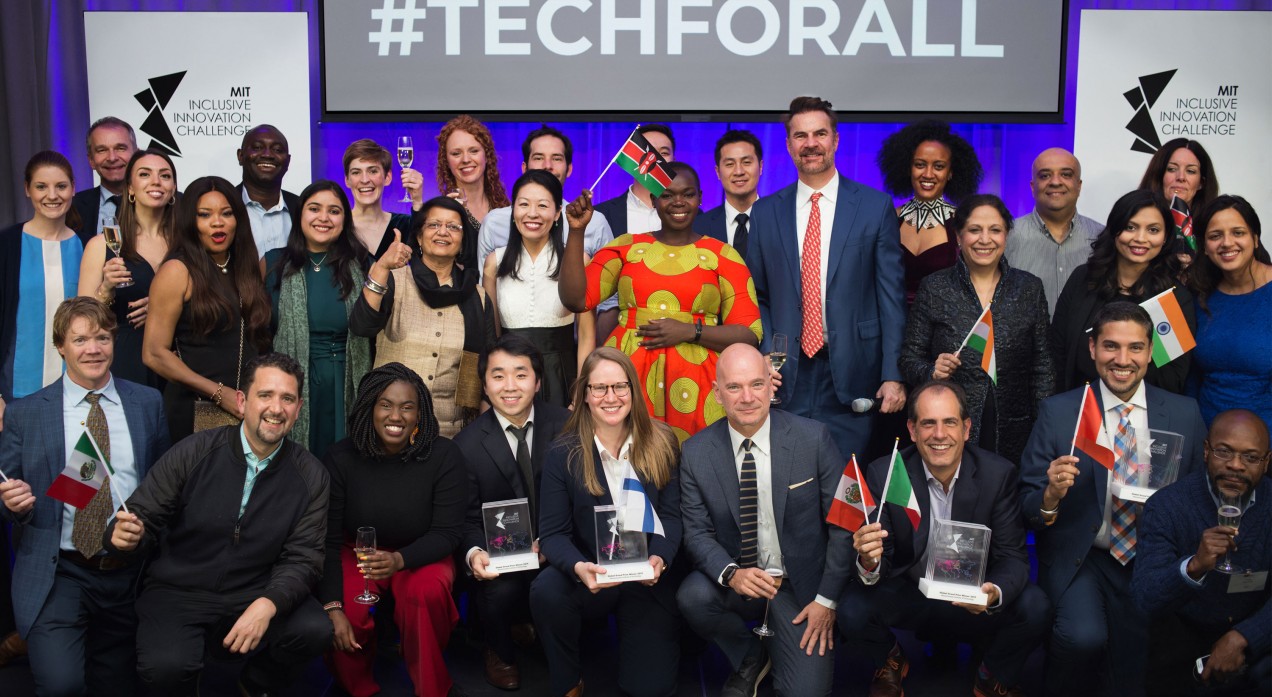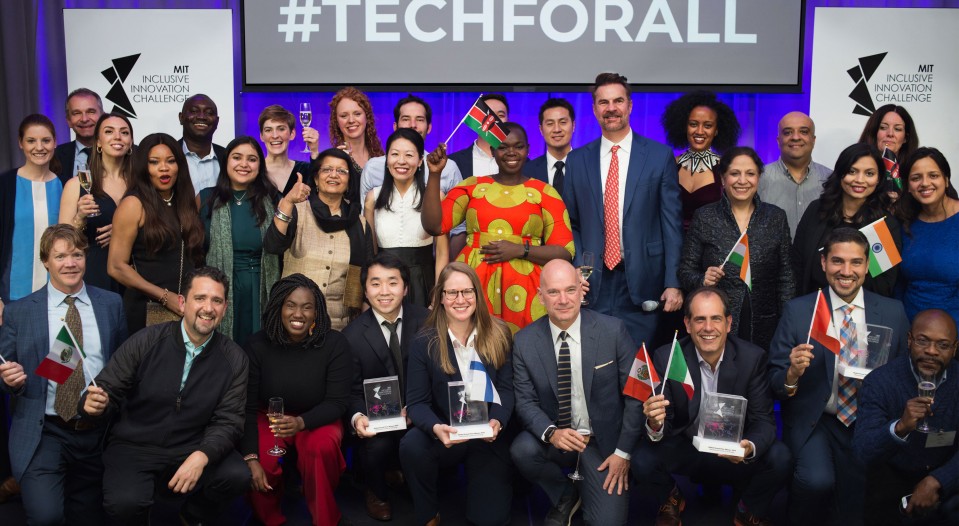

Making innovation inclusive
An MIT contest rewards entrepreneurs who are promoting an equitable future of work.

Living in central Maine could have been a barrier to pursuing a job at MIT, but for Devin Wardell Cook, MBA ’15, it was the ideal opportunity. After graduating from the Sloan School of Management and moving north, Cook led the launch of the MIT Inclusive Innovation Challenge (IIC) in 2016. In just four years she built a global competition that has drawn registrations from more than 4,500 organizations. This past December, she helped lead the transition that will bring the IIC under the umbrella of MIT Solve, an Institute-wide initiative designed to address the world’s most pressing challenges. The fact that she’s done much of this work at a distance of 150-plus miles is not incidental.
“Frankly, I’m the embodiment of what we’ve been trying to drive with the Inclusive Innovation Challenge, which is more digitally enabled workers who can work from wherever and achieve their goals, often outside of the traditional norms,” says Cook. As executive director of the IIC, she brought the competition to life, and she is now ushering in its next chapter.
The IIC was initially founded within the MIT Initiative on the Digital Economy (IDE) by that program’s co-directors: Erik Brynjolfsson, PhD ’91, who is the Schussel Family Professor of Management Science, and Andrew McAfee ’88, ’89, SM ’90.
The IDE focuses on the way people and businesses work, interact, and prosper in a time of rapid digital transformation. As McAfee points out in a 2019 IDE video, there is widespread public concern that this transformation is “automating people out of existence, making their financial lives more precarious, and deskilling and taking their jobs away.” But at the same time, innovators and entrepreneurs are using technology to do just the opposite.
“Technology is racing ahead and creating a lot of progress,” Cook says, “but that prosperity is not being shared across the economic spectrum as broadly as it should be. The idea was to create this future-of-work prize that would help drive more shared prosperity.”
That idea grew into a multi-round contest awarding $1.6 million in prizes annually to “work of the future” entrepreneurs in four categories: skills development and opportunity matching, income growth and job creation, technology access, and financial inclusion. The IIC has called for submissions each spring from startups and entrepreneurial organizations—commercial or nonprofit, at any stage—that are creating economic opportunity for moderate- and low-income earners. The competition went global in 2018, with five regional semifinals worldwide.
“There’s just such a wealth of information and different innovative approaches happening in different regions of the world,” says Cook. “So we wanted to find a way to circulate those different kinds of business models and solutions.”
Uniting with MIT Solve is the next step in the contest’s growth. From now on, participants will submit solutions through the Solve platform, and chosen “Solver teams” will be announced at a Solve Challenge Finals live pitch event, the next of which will be held in September 2020 in New York City. They will then join Solve’s community of peers, funders, and experts to advance their work and scale their solutions globally through a nine-month mentorship program.
Solver teams will also have the opportunity to attend the initiative’s flagship event, Solve at MIT, held on campus each May, where they may earn additional prize money and form connections within Solve’s network of 130 teams and more than 100 member organizations.
Using tech to strengthen livelihoods
Cook, who will stay on as a judge for the Solve 2020 Economic Prosperity Challenge, says running the IIC for the last four years allowed her to merge her passions for entrepreneurship and economic development at a global scale. In 2012, as a Fulbright scholar in India studying hand-crafted textiles, she saw firsthand how low-income artisans could be left behind by technological advances.
“Most of the artisans I worked with were living in poverty, despite being the stewards of an important cultural tradition,” she says. “While the traditional nature of the industry is part of what makes it appealing, there are so many opportunities to utilize technology to improve the outcomes. Digital training for artisans, accessing market information to enable better product/market fit, online sales—there were so many ways that tech might have addressed challenges.”
One early IIC winner, Logistimo—cofounded by Anup R. Akkihal, MEng ’06—has put this idea to the test with enhancements to last-mile deliveries in the southern Indian state of Hubli. The Logistimo smartphone platform gives drivers instructions about routes and deliveries and lets them scan and deliver packages and process payments. In addition to improving delivery efficiency for customers, the platform benefits drivers, in some cases doubling or even quadrupling their income.
“It is well understood that logistical inefficiencies interfere with social and economic development in these frontier markets,” says Akkihal. “We’ve created a business that strengthens rural supply chains and creates livelihoods for drivers and laborers alike.”
Logistimo has grown significantly since receiving its IIC prize in 2017. Its rate of processing, now at around 25,000 orders every month, has been increasing by roughly 15% monthly. Akkihal says the IIC helped his company attract investor support and develop its strategy. “The application process itself was pretty deep, and it forced us to articulate our objectives,” he says. “We started as an impact-oriented social enterprise, so we always moved with the current and were focused on the people. At the time of application, we hadn’t written a lot of this stuff down, so it forced us to be more introspective and thoughtful, and we’re still using that framework today.”
Cook confirms that the IIC process was designed to render value to all participants. Every applicant has received comments and/or scores from at least five of the competition’s hundreds of judges—who include leaders from global industry, nonprofits, academia, government, and venture capital, along with past IIC winners. This type of hands-on evaluation will continue under the Solve program.
For those who have won an IIC prize to date, the outcomes have been considerable. Pending data from the top 2019 teams, IIC winners collectively report that since receiving the prize they have raised $1 billion, benefited more than 170 million people, and directly created more than 7,000 jobs. “We were pleasantly shocked,” Cook remarks of these numbers. “It says to us that these are organizations that are really doing impressive work, changing the nature of work for the long term.”
Changing the nature of work
At the IIC’s Global Grand Prize Gala at MIT in November, the latest four winning teams were announced, and each received $250,000 in prize money. The winners were JobGet, a mobile platform that serves millions of low-income job seekers; Reaktor Education, an online reskilling platform focused on artificial intelligence; Agros, a remote sensing and data management platform for farmers; and Tienda Pago, an online lender that provides small stores in Mexico and Peru with short-term capital loans.
The gala coincided with the MIT AI and the Work of the Future Congress, a two-day on-campus conference organized by IDE, the MIT Computer Science and Artificial Intelligence Lab (CSAIL), and the MIT Work of the Future Task Force. The task force was launched in 2018 to study how technological advances are changing work and to guide the development of strategies—like those sought by the IIC—that promote shared prosperity. (See “Power to the people,” page 12, for more on the task force’s recent report.) The event explored issues that President L. Rafael Reif summarized in a recent briefing on the task force’s initial report: “Automation will transform our work, our lives, our society. Whether the outcome is inclusive or exclusive, fair or laissez-faire, is up to us—all of us.”
As the IIC builds on its momentum at Solve, and with MIT playing a leading role in developing technologies that will change or even dictate the work of the future, Cook says Solve’s global challenges will continue to identify and support organizations focused on inclusive and fair solutions. “The biggest reason for the transition was Solve’s amazing resources,” she says. “This is a way for the legacy of the IIC to grow and live on and most importantly increase the impact that the winning organizations can have on the world.”
Solve was slated to announce its 2020 Global Challenges in February, with applications due in June. To learn more, visit solve.mit.edu.